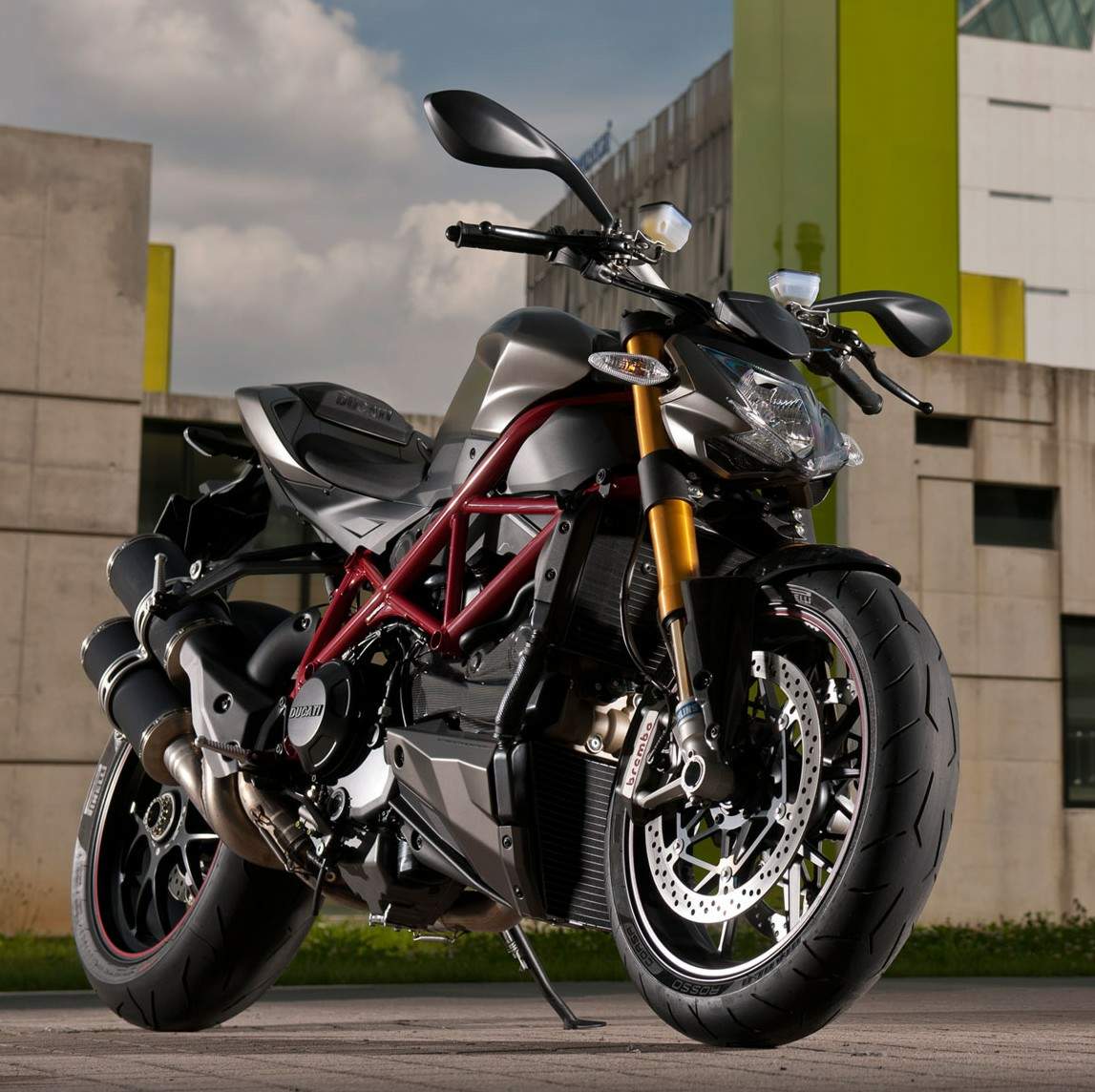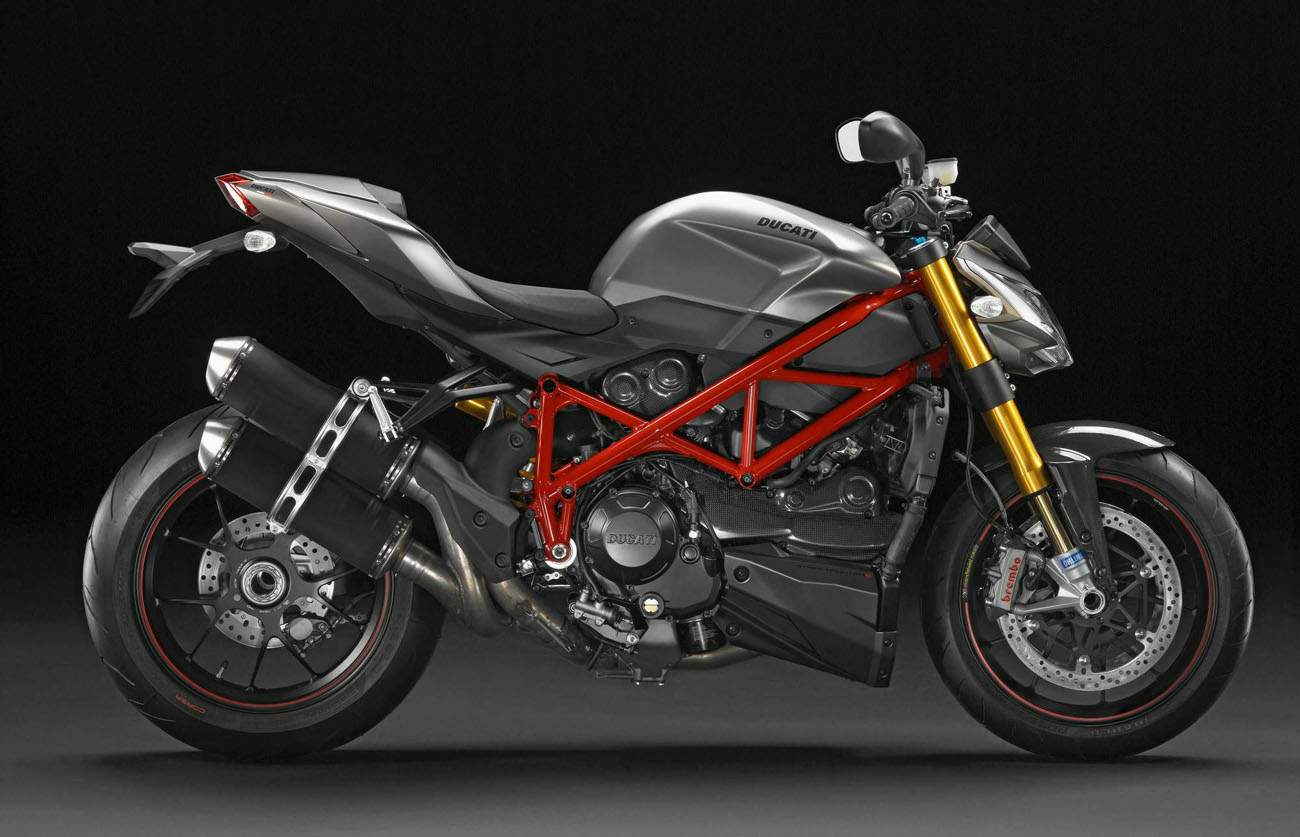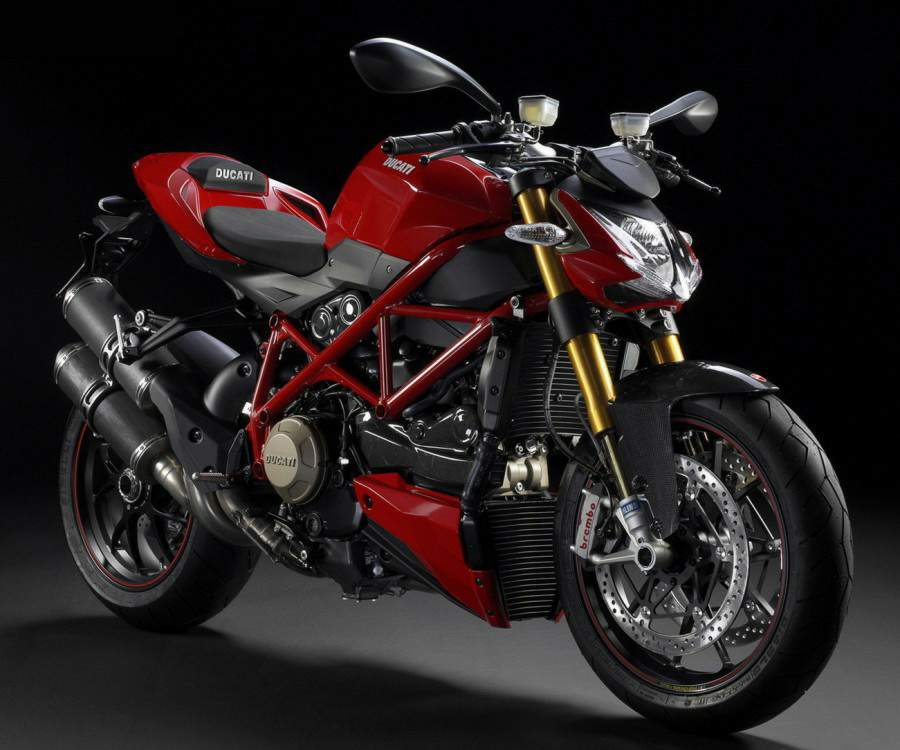
|
|
|
|
|
|
Classic Bikes
Custom Bikes
Individual
Racing Bikes AJP
AJS
Aprilia
Ariel
Avinton / Wakan
Bajaj
Benelli
Beta
Bimota
BMW
Brough Superior
BRP Cam-Am
BSA
Buell / EBR
Bultaco
Cagiva
Campagna
CCM
CF Moto
Combat Motors
Derbi
Deus
Ducati
Excelsior
GASGAS
Ghezzi Brian
Gilera
GIMA
Harley Davidson
Hero
Highland
Honda
Horex
Husaberg
Husqvarna
Hyosung
Indian
Jawa
Kawasaki
KTM
KYMCO
Laverda
Lazareth
Magni
Maico
Mash
Matchless
Mondial
Moto Guzzi
Moto Morini
MV Agusta
MZ / MuZ
NCR
Norton
NSU
Paton
Peugeot
Piaggio
Revival Cycles
Roland Sands
Royal Enfield
Sachs
Sherco
Sunbeam
Suzuki
SWM
SYM
Triumph
TVS
Ural
Velocette
Vespa
Victory
Vincent
VOR
Voxan
Vyrus
Walt Siegl
Walz
Wrenchmonkees
Wunderlich
XTR / Radical
Yamaha
Zero
Video
Technical
Complete Manufacturer List
|
Ducati Streetfighter S
|
|
Make Model |
Ducati Streetfighter S |
|
Year |
2011 |
|
Engine |
Four stroke, 90° “L” twin cylinder, DOHC, desmodromic 4 valves per cylinder |
|
Capacity |
1099 cc / 67.1 cu in |
| Bore x Stroke |
104 x 64.7 mm |
| Cooling System | Liquid cooled |
| Compression Ratio |
12.4:1 |
| Lubrication | Wet sump |
| Exhaust | Lightweight 2-1-2 system with catalytic converter and two lambda probes. Twin stainless steel mufflers |
|
Induction |
Marelli electronic fuel injection, elliptical throttle bodies |
|
Exhaust |
Lightweight 2-1-2 system with catalytic converter and two lambda probes. Twin stainless steel mufflers |
|
Ignition |
Digital CDI |
| Starting | Electric |
|
Max Power |
115.6 kW / 155 hp @ 9500 rpm |
|
Max Torque |
119 Nm / 12.1 kgf-m / 87.5 lb-ft @ 9500 rpm |
| Clutch | Dry multiplate with hydraulic control |
|
Transmission |
6 Speed |
| Final Drive | Chain |
| Frame |
Tubular steel Trellis frame |
|
Front Suspension |
Öhlins 43mm fully adjustable upside-down fork with TiN |
| Front Wheel Travel | 120 mm / 4.7 in |
|
Rear Suspension |
Progressive linkage with fully adjustable Öhlins monoshock with top-out spring. Aluminium single-sided swingarm |
| Rear Wheel Travel | 127 mm / 5.0 in |
|
Front Brakes |
2 x 330 mm Semi-floating discs, radially mounted Brembo Monobloc calipers 4-piston, 2-pad |
|
Rear Brakes |
Single 245 mm disc, 2 piston caliper |
| Front Wheel | 5-Spoke forged light alloy, 3.50 x 17 |
| Rear Wheel | 5-Spoke forged light alloy, 6.00 x 17 |
|
Front Tyre |
120/70 - ZR17 |
|
Rear Tyre |
190/55 - ZR17 |
| Rake | 25.6° |
| Trail | 114 mm / 4.4 in |
| Dimensions |
Length 2102 mm / 82.7 in Width 775 mm / 30.5 in Height 1114 mm / 43.8 in |
| Wheelbase | 1475 mm / 58.1 in |
| Seat Height | 840 mm / 33 in |
|
Dry Weight |
167 kg / 368 lbs |
| Wet Weight | 197 kg / 434.3 lbs |
|
Fuel Capacity |
16.5 Litres / 4.4 US gal / 3.6 Imp gal |
|
Standing ¼ Mile |
10.8 sec / 214 km/l / 133 mph |
|
Standing 1000 m |
20.2 sec / 243.7 km/h / 151.4 mph |
|
Top Speed |
256.9 km/h / 159.6 mph |
The typical streetfighter culture was born on the
backstreets of Northern Europe during the late 70s and 80s, the pioneers taking
high-powered sportbikes, removing the fairings, adding higher bars and
customizing to their likings.
Always on top of the latest market trends, the Italians at Ducati revamped this
underground concept and unveiled their own production version November 2008,
simply called the Ducati Streetfighter. And for 2011, the Streetfighter is
available, but there is also an upgraded version, the Streetfighter S.
Besides the standard features - 155-hp 1098 Desmodromic L-twin, trellis chassis,
single-sided swingarm and Monobloc brakes - the Streetfighter S lost some
weight, down to 368 lbs., and arrives stock with Ducati Traction Control and
Data Analysis, racing-style braking system, fully adjustable, Superbike-spec
Öhlins front and rear suspension and lightweight forged Marchesini wheels.
The Streetfighter riding position is empowering. The lightweight aluminum
tapered bars are higher than on a Superbike, but still flat enough to ride hard,
so machine control is enhanced and the relationship with the front-end remains
in tact. Considerable study on seat, footpeg and handlebar position has
maximized comfort without losing the feeling that you're aboard an extreme naked
Ducati.
The Streetfighter's instrumentation continues that same clean look with a
compact shape that blends into the aggressive line of the headlight. Information
additional to the default read-outs is managed from the left- hand
handlebar-mounted switch gear, allowing the rider to scroll through and select
from various menus.
The display presents rpm and speed, with the former
displayed across the screen in a progressive bar graph. Additionally, the
instruments display lap times, DTC status and level selected (if activated on
Streetfighter S) time, air temperature, coolant temperature, battery voltage,
two trips and a trip that automatically starts as the fuel system goes onto
reserve.
Warning lights illuminate to signify neutral, turn signals, high beam,
rev-limit, low oil pressure, fuel reserve, DTC intervention (if activated on
Streetfighter S) and scheduled maintenance. The instrument display is also used
as the control panels for the DDA and DTC systems as well as listing lap times
recorded by using the high-beam flash button as a stopwatch.
Streetfighter S: Proven Powerhouse L-Twin
The world-beating 1098 Testastretta EVOluzione needs little introduction.
Debuting in 2007, it went on to form the basis of a motor that powered Ducati to
Superstock and Superbike World titles that left the competition stunned. Now,
its massive bore, short stroke and incredible torque powers Ducati's most
extreme naked and the results are equally as stunning.
Producing a ballistic 85 lb-ft (11.7kgm) of torque and 155 hp (114kW), the
Streetfighter's awesome 1098 powerhouse fears nothing of the naked sports
competition. The L-Twin, Testastretta EVOluzione engine gives both the best
power-to-weight and the best torque-to-weight ratios in its class.
Surface features include enhanced detailing on the cam belt covers and the
magnesium dry clutch cover as well as a new black finish for the main outer
casings and carbon-grey finish for the crankcases, which employ the same
weight-saving technology used for the 1198.
The vacuum die-cast process used to make the crankcases ensures consistent and
precise wall thickness and increased strength from absolute material purity
while reducing weight considerably.
Using the Testastretta narrow valve angle, super-straight intake ducts and
specially shaped combustion chambers, the Desmodromic motor continues to breathe
through MotoGP-derived elliptical throttle bodies and four large diameter valves
per cylinder to achieve its incredible spread of torque.

A high performance six-speed box and racing-style
dry clutch makes sure the transmission package delivers 155hp as efficiently as
possible.
The Streetfighter's power house is protected by twin coolant radiators,
carefully curved in pure naked style for optimum performance and stunning with
visual effect. The upper radiator is assisted by lightweight, high flow electric
fan assemblies while the lower sits in the front of the belly pan, which also
houses a highly efficient oil heat exchanger.
Having more experience and success with twin-cylinder high performance engines
than any other manufacturer, the air-cooled L-Twin remains central to Ducati's
philosophy of motorcycling. This experience, plus constant investment in quality
by design, advanced materials and engineering techniques, has enabled a distance
between service intervals of 7,500 miles, making Ducati ownership even more
enjoyable than ever.
The massive Streetfighter 2-1-2 exhaust system is made from weight-saving 1mm
thick steel and flows from 58mm to 63.5mm diameter pipes. The system uses two
lambda probes to ensure precise fuel mapping for optimum performance and an
electronic valve in the mid-section to achieve a wide spread of power.
The cannon-style, vertically stacked mufflers sport the same finishes as the
Superbike family: Brushed steel for the Streetfighter and black brushed steel
for the Streetfighter S, both delivering the famous Ducati L- Twin sound
synonymous with raw, Desmo power.
Streetfighter S: Street-Battling Chassis
At an incredible 167kg (368lb) for the Streetfighter S, the motorcycle comes to
the fight with the highest power-to-weight ratio in their class. The purpose-
built Trellis frame, which uses 25.6° of rake compared with the Superbike's
24.5°, ensures a well-planted front-end, while a 35mm longer single-sided
swingarm at the rear ensures the Streetfighter's acceleration need never be
compromised.
The longer, beautifully created aluminum swingarm follows the same dual
construction detail as the Superbike models and is anodized finished in black.
The lower triple-clamp also gets more muscle development. Formed in a
strength-enhancing gull-wing shape for even more rigidity, it maintains a
vice-like grip on the fork legs, giving a precise and solid feeling through the
bars on fast direction changes.
The revised rake, longer wheelbase and cross-mounted steering damper ensure
stability even under the extreme acceleration of Ducati's incredible L-Twin
torque.
Streetfighter S: High-Tech Suspension
The Streetfighter S pushes the spec way up with 43mm Superbike-spec Öhlins forks
that have sliders treated in low-friction TiN.
Fully adjustable in spring preload and precisely adjustable in compression and
rebound damping, they ensure ‘S' feeling and finesse when the fight gets rough.
Taking care of the rear of the ‘S' is a single high-spec Öhlins unit fully
adjustable in spring preload with full adjustment and highly engineered control
of compression and rebound damping. The unit is also fitted with a ride
enhancing top-out spring which helps maintain rear tyre contact under extreme
conditions.
Important attention to performance detail is inherited from its Superbike
bloodline with the Streetfighter S having rear ride-height adjusters that allow
fine correction after setting
personalized spring preload.
Streetfighter S Wheels: Lightweight & Strong
The Streetfighter S reduces weight even further by using Y-shaped, 5-spoke
wheels by Marchesini, forged and then machined in lightweight aluminum.
The Streetfighter wheels are finished in graphite
grey, while the ‘S' moves to black for 2011 with both models rolling out on
Pirelli Diablo Corsa lll tires.
Streetfighter S: Huge, Powerful Brakes
The Streetfighter S uses Brembo's powerful Monobloc caliper race technology.
Machined from a single piece of alloy, the calipers achieve higher rigidity and
resistance to distortion during extreme braking.
The result not only delivers planet-stopping brake power, but also gives an
enhanced and precise ‘feel' at the brake lever.
The twin Monobloc calipers each have four 34mm pistons that grip huge 330mm
discs to achieve their spectacular performance. The weight of the discs has been
kept to a minimum by using racing-style narrow braking surfaces.
Streetfighter S: Aggressive Appearance
The aggressive looking headlight is the ‘face' of the Streetfighter and it
leaves little doubt as to its character. While the main lighting source and
multi-reflector design provides powerful illumination to cut through the night,
its two evil eye strips of LED positioning lights give a striking and
unmistakable identity to the bike.
Keeping design matters clean and stylish, the directional indicators remain
unobtrusive with clear lenses and colored bulbs, while the rear light is
integral to the shape of the tailpiece, providing unobscured illumination while
maintaining the smooth and elegant look to the high and sharp rear-end.
More attention to detail than ever before went into creating the Ducati
Streetfighter S. Repositioning many of the components usually hidden by bodywork
and continuing to keep them out of sight was a major challenge for the design
and engineering teams, but they've pulled it off with impressive results.
Add to this details such as the perfectly formed passenger seat cover, a rear
hugger fitted as standard equipment and the pre-minimal license plate holder,
and it's plain to see that Ducati have gone that extra step to achieve the
highest level of finish.
Streetfighter S: Intelligent muscle
The Streetfighter S was Ducati's first ever naked sportbike to be fitted with
their awesome Ducati Traction Control (DTC) system.
Accessible from the left-hand switchgear and displayed on the digital
instrumentation, the system offers a choice of eight profiles, or ‘sensitivity
levels', each one programmed with a wheel-spin tolerance matched to progressive
riding levels of skill, graded from one to eight.
While level eight administers a confidence-building, high level of interaction
from the system by activating upon the slightest amount of wheel-spin, level one
offers a much higher tolerance, resulting in less intervention for highly
competent riders. Once the level is selected and DTC activated, both are
displayed on the Streetfighter instrumentation.
The system then analyses data sent from front and rear wheel speed sensors to
detect wheel-spin. Should the system recognize wheel-spin above a certain
threshold, the DTC ECU instantly evaluates the many possible wheel-spin
scenarios before administering two types of interaction in varying amounts.
DTC is able to sense the exact use that the Streetfighter is being put to. From
slow mid-corner acceleration with considerable vehicle inclination to high speed
corner exits while almost upright, DTC is intelligent enough to react according
to each and every situation. It's even smart enough to not intervene if you
decide to perform a burnout or a wheelie.
The first ‘soft' stage of system interaction is executed by high speed software
that instantly makes electronic adjustment to the ignition by administering
varying amounts of retardation to reduce the engine's torque output. During this
initial stage of DTC interaction, both outer warning lights on the Streetfighter
instruments - normally used to signify over-rev - illuminate to signify that DTC
is being applied.
If the DTC software detects that the first ‘soft' stage of system interaction is
inadequate to control the wheel-spin, it continues to administer ignition
retardation and instructs the engine ECU to initiate a pattern of constantly
increasing injection cuts until, if necessary, full injection cut.
During this second stage of system interaction, both outer and central warning
lights fully illuminate to signify that DTC has also initiated injection cuts.
After either stage one (ignition retardation) or stage two (pattern of injection
cuts or full cut), the system incrementally returns to the original ignition and
injection mapping as the wheel speeds approach equalization. This carefully
programmed return to full power delivery is the real key to DTC's smooth and
efficient operation.

In developing its World Championship-winning traction control system for road
use, Ducati continue to demonstrate their strategy of transferring technologies
from their race bikes into the production environment, and show how solutions
developed for performance on the track really can be applied to enhance safety
on the road.
Streetfighter S: Information is power
The Ducati Data Analyser (DDA) - complete with PC software, a USB-ready data
retrieval card and instructions - evaluates the performances of the
Streetfighter and its rider, and provides a graphic presentation of data from
various channels of information.
Normally only available on race bikes, DDA records numerous channels of data
including throttle opening, vehicle speed, engine rpm, engine temperature,
distance travelled, laps and lap times.
The system also automatically calculates engine rpm and vehicle speed data,
enabling gear selection as an extra channel of information. A channel of data is
also dedicated to recording the DTC index, which can then be viewed as a graphic
trace that shows the amount of DTC interaction during wheel-spin. At the end of
a ride or track session, 4mb of data can be downloaded to a PC ready to compare,
analyze and get an inside view on the performance of the rider and
Streetfighter.
Data can be analyzed in graphic form with options to zoom into detail of
specific sections. Dragging a trace along a timeline to reveal individual values
of the above-listed channels enables the user to analyze performance in the same
way that data technicians can in factory teams.

|
Any corrections or more information on these motorcycles will be kindly appreciated. |